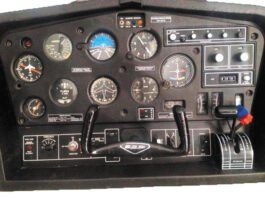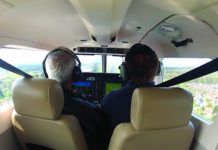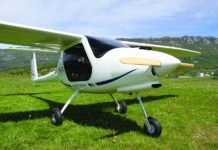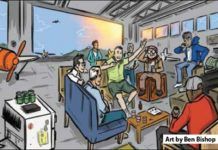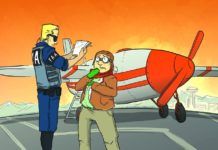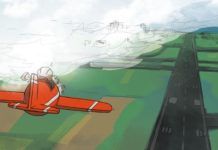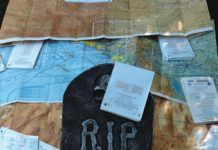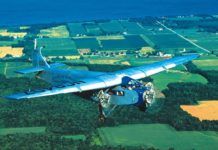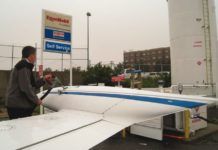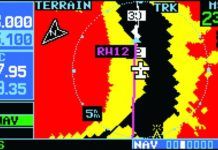Yes to Plane Sharing
With the likes of Uber, arranging ridesharing in automobiles via the Internet is common in todays hi-tech culture. Not so with similar programs to share private airplane seats. If you follow aviation news from sources like AVweb, youre undoubtedly at least aware that Flytenow, Airpooler and similar services using the Internet to unite pilots with passengers willing to share expenses have been shut down by the FAA. The FAA essentially claims that the use of the Internet magically makes that a commercial activity.
Electric IFR: The Way of the Future?
Electric airplanes are becoming a reality. There are already electric trainers in Europe, but the Federal Aviation Administration is just now considering accommodations for electric aircraft batteries and motors. It is reasonable to think that standards for fully certified aircraft with electric propulsion is well on its way.
Hangar Flying
I was once an active airport bum, hanging around the home drome in much of my spare time. Then things got busy, the complexion of the airport changed and, well, I miss those days.
The Great Experiment
Alexis de Tocqueville, a 19th-century French historian, described the United States as a great experiment. He called it an attempt to construct society upon a new basis, founded on theories previously unknown or impracticable. Another great experiment is occurring, this time in aviation.In 2006, ICAO quietly passed the Multiple-Crew Pilot License (MPL). ICAO recognized that many countries trained airline pilots using ab initio programs. These zero-to-hero courses put people with no previous flying experience into the right seat of an airliner in the shortest time possible. The MPL-supplanting the normal path through private and commercial licenses-replaces most piston flying with advanced simulators.
Got Rights?
Of the many tens of thousands of FAA employees, most are conscientious hardworking folks who want to do a good job. Nonetheless, the FAA has a reputation for overly aggressive, yet seemingly arbitrary enforcement action by certain individuals in positions of authority over pilots. A quick read through 14 CFR Part 91 offers a near-infinite number of ways a pilot can run afoul of the FAA with little to protect us. About our only defenses are a legal assistance plan like the AOPA offers and the wholly pilot- and safety-focused Aviation Safety Reporting System (ASRS). (If you dont know about ASRS, download, read and study AC-0046E. Now. My meager words here can wait.)
Maybe You Shouldnt Do that
I once undertook a ferry flight that was, well, dumb. Similarly, a type-specific magazine I get recently ran a true-confessions story by a pilot who, in the clarity of hindsight, probably should have missed, not landed.Most of us accomplished pilots (as the masthead says) can do far more in an airplane than we should. What does that mean? Well, I mean we probably could, for example, safely fly an airplane that isnt quite airworthy or perhaps we could complete an approach to a landing using abnormal maneuvers and live to tell (or brag) about it later.
Paper, I Knew Thee Well
My social security card, first pilots certificate and various other government-issued documents I got years ago were all typed by hand. Computers? Those were barely in the vernacular, much less on the desk. Everything we did was on paper.Computers promised to eliminate that paper. Before I became a professional pilot and later editor of this magazine, I spent 30 years in the computer industry. I did my part to fulfill that no-paper promise, but few others did. If computers were going to eliminate paper, why were we developing printers that could spit out reams of the stuff in seconds? A paperless society seemed an empty promise.
Ford Failed Us
One of our contributors found an aircraft manual from 1929. Its labeled Instruction Manual for Ford Trimotor. It contains elements of a POH/AFM, a flight and operations manual and even a maintenance manual. Thats a lot of information to pack into 112 pages.Perusing it, I began to think about the, um, good old days. No, I dont claim that aircraft or pilots were somehow better back then. Instead, though, I reflected on what it meant that the Ford Motor Company undertook an aviation division and failed.
The Drones are Coming Here
A tiny aircraft, too small to carry a person, flashes past your left wing. You never saw it; neither did ATC. You just had a near miss with a drone.There are large, heavy commercial and military drones capable of flying in the flight levels. Then, there are little drones that range from toys up to Amazons proposed single-package delivery device. While similar, each presents different challenges.
Things Were Forced to Do
My friends with high-performance engines will probably stop returning my phone calls for a few months after I say this, but its finally time for the EPA to push getting the lead out of avgas. And, no, I dont believe its time because our aviation lead is poisoning the brains of squirrels and small children who live under approach paths. Lead isnt healthy for anyone, but were probably too small a source to make that much difference.
Drinking From the Wrong Glass
I recently heard a radio story about training New Yorkers to use chain saws. Pretty funny deal to a guy who grew up heating on wood and now lives in Maine. One chain-saw expert made this biting comment: Can you believe they sell these things in Home Depot?In a way, thats my take-away from the latest NTSB finding that glass-cockpit aircraft dont appear to be safer than those with conventional instruments. My inbox was all atwitter with people commenting on this, and everyone seemed to think these findings supported their point of view.
IFR is Dead – Long Live IFR
It doesnt take much insight to see where instrument flight is headed. Nonetheless, intrepid editors are supposed to prognosticate on such things, so Ill give a shot at plucking some of this low-hanging fruit.It wont be too long-perhaps 10 years, perhaps longer-before terrestrial navaids will all but disappear. Instead, everything will be RNAV-based, from T and Q Routes replacing todays Victor and Jet airways to RNAV approaches. Conventional SIDs and STARs will morph into RNAV procedures. Unfortunately, terrain will still require us to fly circling approaches. However, its entirely possible that those circling approaches will be charted and in the database, making them little more difficult than a charted arc or hold is today.




